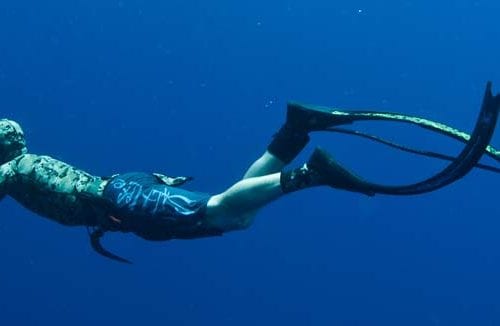Remember the freaky, scary version of the T-1000 in Terminator 2? The terrifying liquid metal robot that could morph his arms into hooks to grab on to a moving car, slide through the bars of a prison cell and reform itself from a puddle of molten metal?
It’s got more in common with an octopus than you might have thought.
Octopus, like Terminator 2’s model T-1000, never get to know their parents, so whatever knowledge they start out with is hard wired. The rest they have to learn mainly through observation – and they have very short life spans in which to accumulate it. Depending on the species, they only live between 6 months and a few years.
Like the T-1000, the Octopus can change its skin colour. An octopus’s camouflage is aided by certain specialised skin cells which can change the apparent colour, opacity, and reflectivity of the epidermis. Here’s one in Thailand that rapidly changed colour when I turned my light on it.
Like the T-1000, an Octopus has ‘distributed intelligence’. Three fifths of an octopus’ neurons are located in its arms. They like to explore with their suckers, which house sensor receptors allowing it to taste and smell what it touches. Severed arms will continue to search for food, and can even be deliberately shed in order to act as decoys.
They learn to use physical objects as tools: the Coconut Octopus (Amphioctopus marginatus) collects shells to protect itself and camouflage its home. Even the common octopus is a collector. This guy at Clifton Gardens was happy to accept my gift of a Red Bull.
Like the T-1000, an Octopus has an almost fluid body. The beak is the only hard part so it can squeeze through any hole larger than its beak, just like the T-1000 at the prison gate! Here’s some footage of an octopus escaping a box through a 1 inch hole.
Fortunately for us, the T-1000 cannot replicate! Whereas octopus can – they can even do it at arms-length. The male uses one arm called a hectocotylus to transfer packets of sperm into the female’s mantle cavity. Without my prior knowledge, and their consent – I accidentally filmed two octopus ‘at it’ in Sydney’s Camp Cove. (Sorry if it’s a bit hard core)
Unfortunately, reproduction is a cause of death: males can live for only a few months after mating, and females die shortly after their eggs hatch. They neglect to eat during the (roughly) one-month period spent taking care of their unhatched eggs, eventually dying of starvation. Pretty dumb actually for the smartest invertebrate in the planet.
So what do we do: we farm them and eat them! So if you enjoy octopus, would you prefer to think it was snatched from the wild, or held in captivity, until it’s killed for your dinner? Here’s a video from WA Fisheries – how to set up an octopus farm!
If you want to see more octopus antics, here’s a great little (longer) video to put you off eating Octopus for good.
(And be honest – you wouldn’t eat a T-1000 either!)



